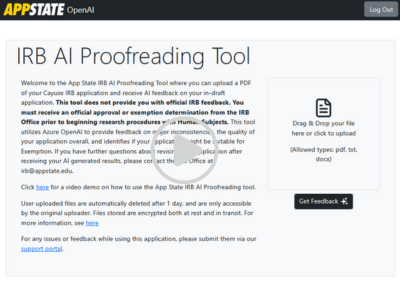AI-Assisted Research
NotebookLM is an AI-powered research assistant developed by Google that can be particularly useful for both faculty and students. This video shows (39:06) it can be utilized to do:
- Document summarization: Upload documents (like PDFs, Google Docs, web URLs and more) to summarize content and provide insights.
- Answer questions: Ask questions about uploaded sources and receive replies with inline citations.
- Content creation: Generate various types of content based on sources such as summaries, timelines, FAQs, a podcast overview and study guides.
- Collaboration: Allows for collaborative note-taking and idea organization, making it a great tool for group projects and research teams.
IRB AI Proofreading Tool
AI Enablement Team Spotlight
The App State Institutional Review Board (IRB) launched the IRB AI Proofreading Tool to assist faculty, staff and students in strengthening in-draft Cayuse IRB applications. Upload a PDF with an application to receive AI-generated feedback on inconsistencies, clarity and whether a submission might qualify for exemption. Learn more: Introducing the App State IRB AI Proofreading Tool.
Video demo: How to use the App State IRB proofreading tool (7:23), 2025.
Uses of AI in R&D
AI can help enhance the clarity, consistency and accessibility of funding proposals and make collaborations more effective by assisting with the following:
Microsoft Copilot
- Document editing – Proofread documents for spelling and grammatical errors.
- Document revision – Get suggestions on how to make documents more concise.
- Document review – Have proposal documents reviewed for adherence to guidelines and review criteria.
- Funding opportunities - Ask AI to identify funding opportunities that match your research interests.
NotebookLM
- Conversation Summaries – Extract key points from emails, chats, and documents.
- Brainstorming and outlining – Structure ideas for a proposal for a specific funding opportunity.
- Content updates – Suggest documentation revisions to eliminate repetitive information and make the proposal more concise.
- Literature review - Produce summaries of research articles and search for key information within the articles.
Zoom AI Companion
- Meeting transcriptions – Get real-time captions and transcripts of meetings with your proposal team.
- Catch-up summaries – Recap discussions for late joiners.
- Action items – Detect and list follow-up tasks.
Google Gemini
- Research planning – Generate a structured plan based on a given topic or question, outlining steps, sources, and potential knowledge gaps.
- Generating research questions – based on existing literature to explore new angles and perspectives.
- Exploring hyperlocal information – Gemini's Deep Research feature is particularly useful for finding information about specific locations or communities.
AI is Transforming Research
Researchers are leveraging AI to support and enhance a variety of tasks, including:
- Literature review
- Data analysis
- Grant writing
- Content writing and editing
- Collaboration
AI is driving a transformation across all fields of science, from developing drugs for incurable diseases to improving the understanding of animal communication, The Economist (16:01), 2024.
Learn More
Stay informed about federal, institutional and research governing body regulations on AI use in research and peer review.
Maintain a repository of AI tool use and guidance on documenting GenAI content in research, including searching, screening, appraising and synthesizing and summarizing.
